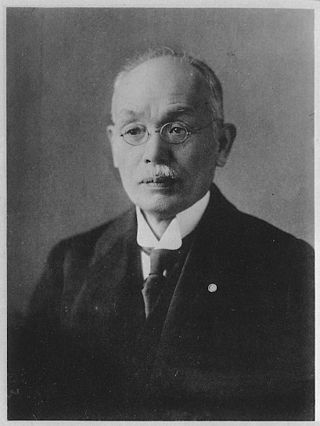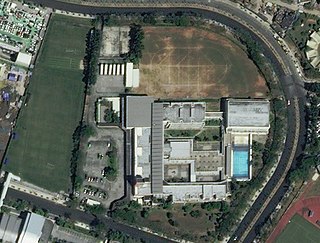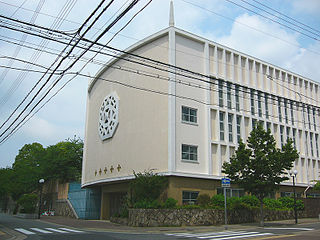Ritsumeikan University is a private university in Kyoto, Japan, that traces its origin to 1869. With the Kinugasa Campus (KIC) in Kyoto, and Kyoto Prefecture, the university also has a satellite called Biwako-Kusatsu Campus (BKC) and Osaka-Ibaraki Campus (OIC).

Inoue Tetsujirō was a Japanese philosopher, poet and educator. He is known for introducing Western philosophy in Japan and for being a pioneer in Eastern philosophy. He became the first Japanese professor of philosophy at Tokyo Imperial University, and also served as the 2nd President of Daito Bunka Academy.

The Manila Japanese School, is a Japanese school located at the Bonifacio Global City in Taguig, Philippines. It caters mainly to Japanese students who are residing in the Metro Manila area.
Hisashi Inoue is a Japanese historian. His area of expertise is modern Chinese history and Sino-Japanese relations. Since 2001 he has been a professor in the faculty of law at Surugadai University after having served as associate professor at the same university.

Shintarō Arakawa is a Japanese linguist who specializes in the study of the extinct Tangut language.
The Koji Ruien (古事類苑) is a Japanese encyclopaedic work initiated by the Meiji government, and compiled from historical source documents. Over the period from 1896 to 1914, a total of 1,000 volumes were compiled, under various subject categories.

The Japanese School of Brussels a.s.b.l. is a Japanese international school located in Auderghem, Brussels. The school serves elementary and junior high school levels. It is Belgium's only Japanese international school. The Japanese Supplementary School of Brussels, a supplementary school operated on Saturdays, is held on the premises of the JSB.

The Shanghai Japanese School (SJS) is a Japanese international school serving primary and junior high school levels in Shanghai. It has two campuses, one in Hongqiao and one in Pudong. The school's teachers are Japanese citizens. The school also has a senior high school component.

The Escola Japonesa de São Paulo is a Japanese international day school in Vila Prel, Capão Redondo, Subprefecture of Campo Limpo, São Paulo, operated by the Sociedade Japonesa de Educação e Cultura. It serves students from 6 to 15 years of age in grades 1 through 9. Most of the students have Japanese company executives as parents. The school uses the Japanese curriculum.

Hoshū jugyō kō (補習授業校), or hoshūkō (補習校), are supplementary Japanese schools located in foreign countries for students living abroad with their families. Hoshū jugyō kō educate Japanese-born children who attend local day schools. They generally operate on weekends, after school, and other times not during the hours of operation of the day schools.

The Hong Kong Japanese School and Japanese International School (HKJS&JIS) is a Japanese international school in Hong Kong. It consists of a Japanese section and international section. The Hong Kong Japanese School Limited operates the school system.
The Japanese Community School of Athens was a Japanese international school in the Ano-Pefki area of Pefki, Greece in the Athens urban area.

The Japanese School in Prague is a Japanese international school in Řepy, District 6, Prague, Czech Republic. It is attached affiliated with the Embassy of Japan in Prague.

The Yokohama Yamate Chinese School is a Chinese-style primary and junior high school in Naka-ku, Yokohama, Japan. Serving levels kindergarten through ninth grade, it is one of two Chinese schools in Japan oriented towards Mainland China, and one of five Chinese schools total. As of 2008 Pan Minsheng is the principal.

Kobe Chinese School is a Chinese international school in Chuo-ku, Kobe, Japan. It is one of two Mainland China-oriented schools in Japan, the other being Yokohama Yamate Chinese School. It provides elementary and junior high school education in grades 1-9 and offers first choice in admission to children of alumni. The second choice is priority to Chinese people. The school established a policy of trying to minimize enrollment of Japanese students in 2000. In 2008 about 40% of the students were Japanese nationals who are ethnic Chinese.
The Japanese Weekend School of New York is a Japanese supplementary school in the New York City metropolitan area. It has its offices in New Roc City in New Rochelle, New York. The Japanese Educational Institute of New York manages the school system, and the JWSNY is one of its two weekend school systems. The JEI also operates two Japanese day schools in the New York area.

The Osaka Chinese School is a Chinese international school in Naniwa-ku, Osaka, Japan. It serves grades 1-9Ú.

Asociación Academia de Cultura Japonesa is a Japanese international school in Surco, Lima, Peru. It is under the Asociación Academia de Cultura Japonesa, which has the same Spanish name but a different Japanese name. It serves elementary and junior high school levels.
This article lists non-Japanese people who were ninja, or similar covert agents influenced by ninja.












